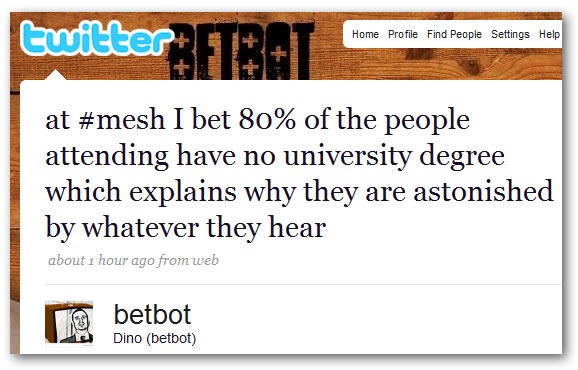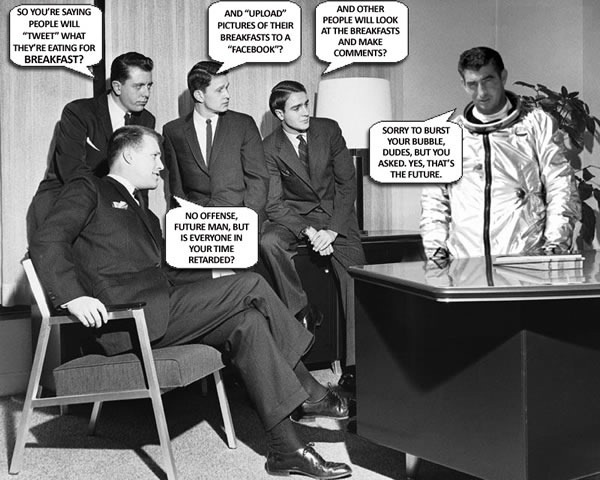Chances are, as a reader of this blog, people ask you to explain Twitter to them. If that’s the case you might find this video in which Ben Stiller explains Twitter to Mickey Rooney amusing:
Tag: Twitter

When I read that Twitter and Facebook were attacked for the sake of targeting one guy, my first thought was “Who is this guy, Jason Bourne?”
Marc Stiegler
 I met science fiction author, software developer and computer security guy Marc Stiegler at the first incarnation of O’Reilly’s Emerging Technology Conference in 2002, but I’d been acquainted with his work prior to that. I’d heard of his programming language called E and had read his science fiction novel Earthweb, whose plot could be grossly oversimplified down to the summary “Twitter saves the world” (it’s a little bit more than that, but I think it conveys the idea nicely).
I met science fiction author, software developer and computer security guy Marc Stiegler at the first incarnation of O’Reilly’s Emerging Technology Conference in 2002, but I’d been acquainted with his work prior to that. I’d heard of his programming language called E and had read his science fiction novel Earthweb, whose plot could be grossly oversimplified down to the summary “Twitter saves the world” (it’s a little bit more than that, but I think it conveys the idea nicely).
Marc’s Final Exam
However, when I think of Marc, what comes to mind first is the final exam that he gave to students at his “Future of Computing” course and published online in 1999. In it, he posed a set of problems and asked them how a specific set of proposed web technologies could be used to solve them. The course and exam have a very strong sense of “technology trumps legislation”, an idea that was surfacing in the late 1990s.
In the exam, students had to pick 5 out of 11 problems that Marc posed and then explain how any combination of the following technologies could be used to solve them:
- Unforgeable pseudonymous identities
- Bidirectional, typed, filterable links
- Arbitration agents
- Bonding agents
- Escrow agents
- Digital Cash
- Capability Based Security with Strong Encryption
(If some of these ideas are unfamiliar to you, don’t worry. They’re not important in the context of this article, and you can always Bing them.)
Here’s a selection of the problems posed in the exam. Remember, this exam is from ten years ago!
1) Searching for a decision analysis tool on the Web, you find a review in which the reviewer raves about a particular product. You buy the product and discover it just doesn’t work. You desire to prevent this person’s ravings from harming anyone else–and you desire to prevent the product from disappointing anyone else.
4) You start receiving thousands of emails from organizations you don’t know, all hawking their wares. You want it to stop, just stop!
5) You wish to play poker with your friends. They live in Tampa Florida, you live in Kingman. This is illegal in the nation where you happen to be a citizen. You want to do it anyway.
6) You hear a joke that someone, somewhere, would probably find offensive. You wish to tell your precocious 17-year-old daughter, who is a student at Yale. The Common Decency Act Version 2 has just passed; it is a $100,000 offense to send such material electronically to a minor. You want to send it anyway–it is a very funny joke.
7) Someone claiming to be you starts roaming the Web making wild claims. You want to make sure people know it isn’t really you.
The Final Question
The most compelling question on the exam is the final one. It required a far more extensive answer than the other ten – so much more extensive that Marc actually suggested that it might be better not to answer the question in the exam, but to at least think about it:
But…if you can answer Question 11 in your own mind, even though you choose not to write up that answer for this examination, then a most remarkable thing will happen: you will walk out of this class with something profoundly worth knowing.
Here’s that final question:
11) You live in North Korea. Three days ago the soldiers came to your tiny patch of farmland and took the few scraps of food they hadn’t taken the week before. You have just boiled the last of your shoes and fed the softened leather to your 3-year-old child. She coughs, a sickly sound that cannot last much longer. Overhead you hear the drone of massive engines. You look into the sky, and thousands of tiny packages float down. You pick one up. It is made of plastic; you cannot feed it to your daughter. But the device talks to you, is solar powered, and teaches you how to use it to link to the Web. You have all the knowledge of the world at your fingertips; you can talk to thousands of others who share your desperate fate. The time has come to solve your problem in the most fundamental sense, and save the life of your daughter.
The final question really stands out. Unlike the other questions in the exam, this one really pulls at the heartstrings, and it sparked a lot of discussion among geeks back around 1999 and 2000, in settings both online and real-life.
Iran and the Final Question
If you follow the American news cycle, the mental distance between North Korea and Iran is a short one; both are countries in the “Axis of Evil” (a term invented by a Toronto guy, by the way) run by repressive regimes and working on their nuclear weapons capabilities. What if we changed the final question’s setting from North Korea to Iran?
Unlike North Korea, Iran’s people have access to technology and communications with the outside world (there’s a recent Daily Show segment in which Jason Jones finds people in Iran who know Jon Stewart’s George Bush “I’m the decider” schtick). They don’t need to have Marc’s hypothetical iPhones delivered to them in care packages; they have things like Twitter and YouTube at their disposal. So I propose another slight modification to the final question: What if we changed the hypothetical hardware into actual working software like Twitter and YouTube?
(It’s another “software, not hardware, is really the trick” situation. Just as we found out in Terminator 3 that SkyNet was really software, it turns out that what might save Iran was social networking software, not portable internet-accessing hardware dropped by parachute.)
With my two suggested changes, it becomes very apparent that we’ve moved from theory to practice. The people of Iran are taking Marc Stiegler’s final exam, and they’ve picked its most difficult question.
Let’s hope they pass.
The Zend Developer Zone article Using the Twitter API with PHP and PEAR covers the Services_Twitter PEAR package, which the articles describes as follows:
Services_Twitter works by providing a full-fledged, object-oriented interface to the Twitter API. This interface insulates you from the nitty-gritty of working directly with REST requests and, by representing responses as SimpleXML objects, makes it very easy to access specific elements of the returned data. This not only saves time; it’s also simpler, because it’s no longer necessary to be intimately aware of the nitty-gritties of the Twitter API in order to use it effectively.
It looks as thought the Twitter user going by the handle of betbot is going to spend the next little while absorbing a very important lesson about managing one’s online persona after making this tweet at the Mesh Conference:
betbot’s profile vaingloriously proclaims that he has three Master’s degrees:
Self-proclaimed marketing guru trying to put my 3 hard-earned Masters to work
If you;ve spent any time on a university campus, you know that having that many Master’s degrees is not a boasting point; it’s a cry for help – it means you’re a shiftless pedant majoring in life-avoidance studies. As for putting “marketing guru” in your Twitter profile; it’s a cliche on par with “I like long walks on the beach” in the personal ads.
Here’s the bit from last night’s Daily Show called Old Man Stewart Shakes His Fist at Twitter, courtesy of VentureBeat (at least until the folks at YouTube have to remove the video):
And for those of you who missed it, here’s Twitter co-founder and chief exec Evan Williams talking about Twitter on Charlie Rose, once again courtesy of VentureBeat:


